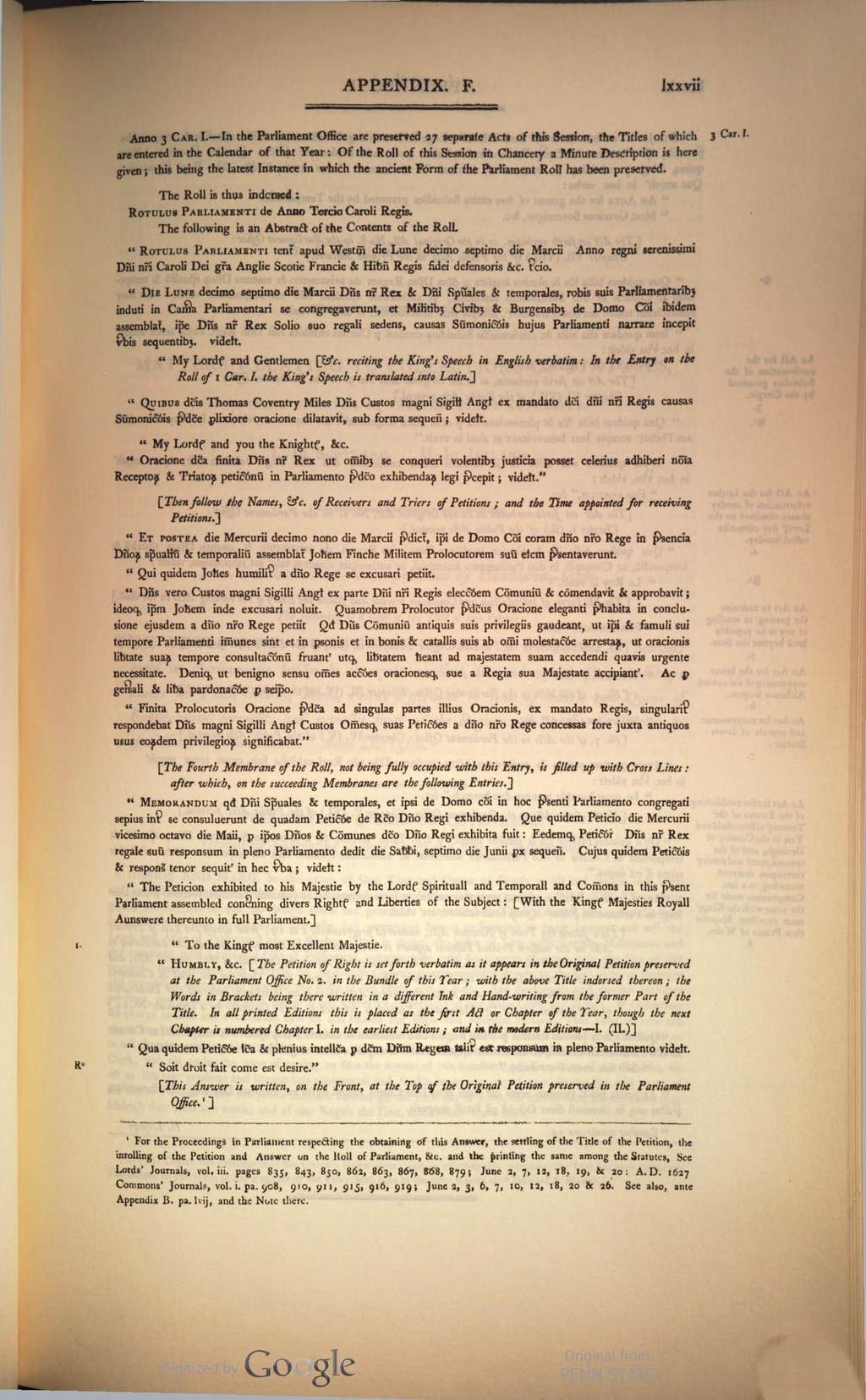Anno 3 Car. I.—In the Parliament Office are preserved 27 separate Acts of this Session, the Titles of which are entered in the Calendar of that Year: Of the Roll of this Session in Chancery a Minute Description is here given; this being the latest Instance in which the ancient Form of the Parliament Roll has been preserved.
The Roll is thus indorsed:
Rotulus Parliamenti de Anno Tercio Caroli Regis.
The following is an Abstract of the Contents of the Roll.
“Rotulus Parliamenti tent̃ apud Westm̄ die Lune decimo septimo die Marcii Anno regni serenissimi Dñi nr̃i Caroli Dei gr̃a Anglie Scotie Francie & Hib̴n̄ Regis fidei defensoris &c. t͛cio.
“Die Lune decimo septimo die Marcii Dñs nr̃ Rex & Dñi Spũales & temporales, robis suis Parliamentaribꝫ induti in Cam͛a Parliamentari se congregaverunt, et Militibꝫ Civibꝫ & Burgensibꝫ de Domo Cõi ibidem assemblat̃, ip̃e Dñs nr̃ Rex Solio suo regali sedens, causas Sūmonic͠ois hujus Parliamenti narrare incepit v͛bis sequentibꝫ. videl̵t.
“Quibus dc̃is Thomas Coventry Miles Dñs Custos magni Sigil̴l̴ Angl̵ ex mandato dc̃i dñi nr̃i Regis causas Sūmonic͠ois p͛dc̃e ꝓlixiore oracione dilatavit, sub forma sequen̄; videl̵t.
“My Lordꝭ and you the Knightꝭ, &c.
“Oracione dc̃a finita Dñs nr̃ Rex ut om̄ibꝫ se conqueri volentibꝫ justicia posset celerius adhiberi nōīa Receptoꝝ & Triatoꝝ petic͠onū in Parliamento p͛dc̃o exhibendaꝝ legi p͛cepit; videl̵t.”
“Et postea die Mercurii decimo nono die Marcii p͛dict̃, ip̃i de Domo Cõi coram dño nr̃o Rege in p͛sencia Dñoꝝ sp̃ualiū & temporaliū assemblat̃ Joh̴em Finche Militem Prolocutorem suū el̵cm p͛sentaverunt.
“Qui quidem Joh̴es humilit͛ a dño Rege se excusari petiit.
“Dñs vero Custos magni Sigilli Angl̵ ex parte Dñi nr̃i Regis elecc͠oem Cōmuniū & cōmendavit & approbavit; ideoqꝫ ip̃m Joh̴em inde excusari noluit. Quamobrem Prolocutor p͛dc̃us Oracione eleganti p͛habita in conclusione ejusdem a dño nr̃o Rege petiit Qd̵ Dũs Cōmuniū antiquis suis privilegiis gaudeant, ut ip̃i & famuli sui tempore Parliamenti im̄unes sint et in ꝑsonis et in bonis & catallis suis ab om̄i molestac͠oe arrestaꝝ, ut oracionis lib̴tate suaꝝ tempore consultac͠onū fruantr utqꝫ lib̴tatem h̴eant ad majestatem suam accedendi quavis urgente necessitate. Deniqꝫ ut benigno sensu om̄es acc͠oes oracionesqꝫ sue a Regia sua Majestate accipientr. Ac ꝓ gen͛ali & lib̴a pardonac͠oe ꝓ seip̃o.
“Finita Prolocutoris Oracione p͛dc̃a ad singulas partes illius Oracionis, ex mandato Regis, singularit͛ respondebat Dñs magni Sigilli Angl̵ Custos Om̄esqꝫ suas Petic͠oes a dño nr̃o Rege concessas fore juxta antiquos usus eoꝝdem privilegioꝝ significabat.”
“Memorandum qd̵ Dñi Sp̃uales & temporales, et ipsi de Domo cõi in hoc p͛senti Parliamento congregati sepius int͛ se consuluerunt de quadam Petic͠oe de Rc̃o Dño Regi exhibenda. Que quidem Peticio die Mercurii vicesimo octavo die Maii, ꝑ ip̃os Dños & Cōmunes dc̃o Dño Regi exhibita fuit: Eedemqꝫ Petic͠oi Dñs nr̃ Rex regale suū responsum in pleno Parliamento dedit die Sab̴b̴i, septimo die Junii ꝓx sequeñ. Cujus quidem Petic͠ois & respons̃ tenor sequitr in hec v͛ba; videl̵t:
“The Peticion exhibited to his Majestie by the Lordꝭ Spirituall and Temporall and Com̄ons in this p͛sent Parliament assembled conc͛ning divers Rightꝭ and Liberties of the Subject: [With the Kingꝭ Majesties Royall Aunswere thereunto in full Parliament.]
To the Kingꝭ most Excellent Majestie.
“Humbly, &c. [The Petition of Right is set forth verbatim as it appears in the Original Petition preserved at the Parliament Office No. 2. in the Bundle of this Year; with the above Title indorsed thereon; the Words in Brackets being there written in a different Ink and Hand-writing from the former Part of the Title. In all printed Editions this is placed as the first Act or Chapter of the Year, though the next Chapter is numbered Chapter I. in the earliest Editions; and in the modern Editions—I. (II.)]
“Qua quidem Petic͠oe lc̃a & plenius intellc̃a ꝑ dc̃m Dñm Regem talit͛ est responsum in pleno Parliamento videl̵t.
“Soit droit fait come est desire.”
- ↑ For the Proceedings in Parliament respecting the obtaining of this Answer, the settling of the Title of the Petition, the inrolling of the Petition and Answer on the Roll of Parliament, &c. and the printing the same among the Statutes, See Lords’ Journals, vol. iii. pages 835, 843, 850, 862, 863, 867, 868, 879; June 2, 7, 12, 18, 19, & 20: A. D. 1627 Commons’ Journals, vol. i. pa. 908, 910, 911, 915, 916, 919; June 2, 3, 6, 7, 10, 12, 18, 20 & 26. See also, ante Appendix B. pa. lvij, and the Note there.
